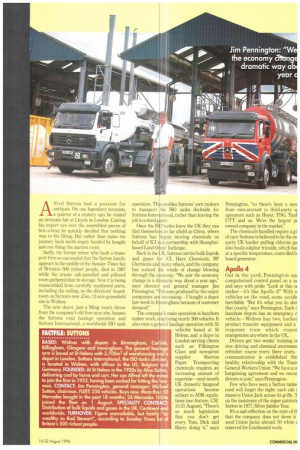A lfred Sutton had a passion for antiques. On one legendary
Page 35

If you've noticed an error in this article please click here to report it so we can fix it.
occasion, a quarter of a century ago, he visited an antiques fair at Lloyds in London. Casting his expert eye over the assembled pieces of bric-a-brac he quickly decided that nothing was to his liking. But rather than make the journey back north empty handed he bought just one thing: the auction room.
Sadly, the former miner who built a transport firm so successful that the Sutton family appears in the middle of the Sunday Times list of Britain's 500 richest people, died in 1987 while the ornate oak-panelled and pillored room gathered dust in storage. Now it is being reassembled from carefully numbered parts, including the ceiling, as the directors' boardroom on Sutton's new £5m, 12-acre greenfield site in Widnes.
The new depot, just a Ming vase's throw from the company's old four-acre site, houses the Suttons road haulage operation and Suttons International, a worldwide IS() tank
operation. Th enables Suttons' own tankers to transport the ISO tanks dockside for Suttons Inter tional, rather than leaving the job to a third Once the I tanks leave the UK they can find themselv a far afield as China, where Suttons has egun moving chemicals on behalf of ICI i a partnership with Shanghai basedLand ear Inchcape.
Back in the K. Suttons carries bulk liquids and gases firrr ICI, Hays Chemicals, BP Chemicals and many others, and the company has noticed the winds of change blowing through the eon my. "We saw the economy change in a chtarnatic way about a year ago," says director and general manager Jim Pennington. "Volumes produced by the major companies are increasing—I bought a depot last week in IMmingham because of customer demand." I The compaOy's main operation is hazchem tanker work, etnploying nearly 200 vehicles. It also runs a gerieral haulage operation with 55 vehicles based at St Helens, and a depot in London serving clients such as Pilkington Glass and newsprint supplier Shotton Paper. Transporting chemicals requires an increasing amount of expertise—next month UK domestic hazgood operations become subject to ADR regulations (see feature, CM, 15-21 August). "There's so much legislation that you don't get every Tom, Dick and Harry doing it," says Pennington, "so there's been a inor from own-account to third-party si operators such as Hoyer, TDG. Tani UTT and us. We're the largest pi owned company in the market."
The chemicals handled require a gr of care: Suttons is believed to be the on party UK haulier pulling chlorine ga also hauls sulphur trioxide, which ha; at a specific temperature, controlled b board generator.
Apollo 4
Out in the yard, Pennington opr computerised control panel on a ix and says with pride: "Look at this or tanker—it's like Apollo 4!" With si vehicles on the road, some accide inevitable. "But it's what you do abo that counts," says Pennington. Each c hazchem depots has an emergency r vehicle—Widnes has two, backeC product transfer equipment and a response team which respor emergencies anywhere in the UK.
Drivers get two weeks' training oi sive driving and chemical awarenes; refresher course every three years. communication is established thri healthy relationship with the Tram General Workers Union: "We have a a bargaining agreement and we encou drivers to join," says Pennington.
Few who have seen a Sutton tanke road will forget the sight: each cab E massive Union Jack across its grille. T on the insistence of the super-patrioti■ Sutton in 1977, SiIverjubilee Year.
It's a sad reflection on the state of tF that the company does not deem it send Union Jacks abroad: 50 white c reserved for Continental work.




































































































